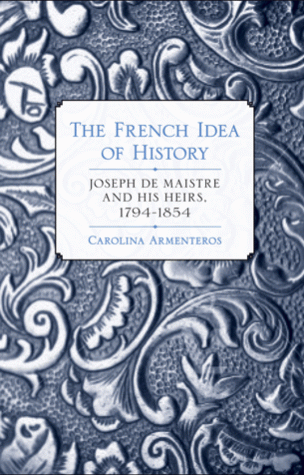
Carolina Armenteros, The French Idea of History: Joseph de Maistre and His Heirs, 1794–1854
Ithaca (NY) : Cornell University Press, 2011.
EAN 9780801449437.
368 p.
Prix: 41.95EUR.
Présentation de l'éditeur :
"A fierce absolutist, a furious theocrat . . . the champion of the hardest, narrowest, and most inflexible dogmatism . . . part learned doctor, part inquisitor, part executioner." Thus did Émile Faguet describe Joseph-Marie de Maistre (1753–1821) in his 1899 history of nineteenth-century thought. This view of the influential thinker as a reactionary has, with little variation, held sway ever since. In The French Idea of History, Carolina Armenteros recovers a very different figure, one with a far more subtle understanding of, and response to, the events of his day. Maistre emerges from this deeply learned book as the crucial bridge between the Enlightenment and the historicized thought of the nineteenth century. Armenteros demonstrates that Maistre inaugurated a specifically French way of thinking about past, present, and future that held sway not only among conservative political theorists but also among intellectuals generally considered to belong to the left, particularly the Utopian Socialists.
The historical rupture represented by the French Revolution compelled contemporaries to reflect on the nature and meaning of history. Some who remained religious during those years felt history with particular intensity, awakening suddenly to the fear that God might have abandoned humankind. This profound spiritual anxiety emerged in Maistre's work: under his pen, everything—knowledge, society, religion, government, the human body—had to be historicized and temporalized in order to be known. The imperative was to end history by uncovering its essence. Socialists, positivists, and traditionalists drew on Maistre's historical ideas to construct the collective good and design the future. The dream that history held the key to human renewal and the obliteration of violence faded after the 1848 revolutions, but it permanently changed French social, political, moral, and religious thought.
"Maistre’s gifts as a stylist are sometimes used to discount his political theory; in Carolina Armenteros's trenchant expression, Maistre has been 'praised as a writer into oblivion as a political theorist.' In fact, argues Armenteros in this subtle, provocative, and at times stunningly original book, the traditional image of Maistre is deeply misleading. Far from being a complete reactionary seeking a return to an idealized past, Maistre was in at least some respects a moderate who recognized the necessity for political change."—Jonathan Beecher, author of Charles Fourier: The Visionary and His World
Summary—
Introduction: Conservatism and History
A Brief Intellectual Biography
Part One: Joseph de Maistre and the Idea of History, 1794–1820
1. The Statistical Beginnings of Historical Thought: Joseph de Maistre against
Jean-Jacques Rousseau, 1794–96
2. Maistrian Epistemology and Pedagogy in Historical Perspective
3. A Europeanist Theory of History: Du pape
4. Redemption by Suffering: Social Violence and Historical Development in the Éclaircissement sur les sacrifices
5. Returning the Universe to God: Time, Will, and Reason in Les soirées de Saint-Pétersbourg
Part Two: Historical Thought in France, 1798–1854
6. The New Truth of Historical Knowledge: Liberty, Order, and the Rise of the Social Fact, 1797–1848
7. Historical Progress and the Logic of Sacrifice, 1822–54
8. The Metapolitics of History: Socialism, Positivism, and Tradition, 1820–48
Conclusion: History and Paradox
Bibliography
Index